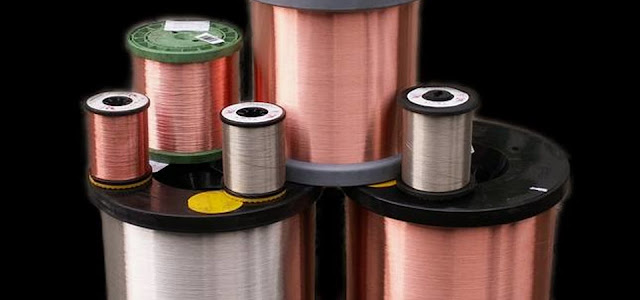Uses of Copper Wire
Copper has been the most favored metal for electrical wiring and
connectors for centuries since the invention of the telegraph and
electromagnet. Its growth accelerated with the introduction of the telephone in
1876. For nearly 200 years, copper has been extensively used in various
electrical settings, telecommunications, power generation, transmission, and
distribution.
Reddish-brown in color, copper is a highly ductile and malleable
metal. It can be stretched and drawn into wire strands as thin as human hair.
The metal has a high thermal and conductivity and can be put to many uses.
Among all the uses of this versatile metal, 60% of copper is used in making
electrical wires.
Copper wire: what makes it popular in electrical wiring?
All metals have some amount of resistivity against electric
currents and hence they need a power source to push the current through them.
The lower the resistivity and better is the conductivity. Copper has a
low-level of resistivity, making it an excellent conductor of electricity.
Copper is less prone to corrosion and oxidation as compared to
other metals like aluminium. Oxidation (when a metal reacts with the air and
oxygen present in the atmosphere) can corrode the metal’s surface, forming a
thin layer like rust on iron and steel. Copper develops a green patina (copper
oxide) which unlike rust actually protects the metal from further corrosion and
allows electricity to pass through it.
Let’s look at some of the properties of copper:
-
Corrosion resistance
-
Good electrical conductivity
-
Good thermal conductivity
-
Catalytic
-
Easy to alloy, ductile, tough, and hygienic
-
Non-magnetic and recyclable
 |
| Copper Wire Manufacturers |
Popular uses of copper wire
Every copper wire has a specific usage and application. For
example, stranded copper wire is used in scenarios where constant movement and
flexibility is needed. Similarly, braided copper wire jumpers are used in
transformers, computers, generators, etc. to provide the greatest flow of
electricity.
Some popular uses of copper wire can be seen in the following
industries.
Automobile industry
Copper is highly used in the automotive industry due to its
ability to bend easily. With a high melting point, they can also be freely
installed in applications that go through frequent temperature changes. Their
uses are also seen in electric motors and cars in the wire harness, radiator,
brake tubes, etc.
Electricity supply
Copper wire is used for electric power transmission, transformers,
wire and cables, plug components, connectors, jumpers like braided copper wire
jumpers, hollow wire, etc. They are also used in cables and residential
electrical circuits. It is one of the most popularly used products.
Electronics industry
They are heavily used in the electronics industry like in
integrated circuits, copper printed circuits, vacuum electronic devices, etc.
Energy and Petrochemical industries
Solar heaters, condenser tubes, plates, pipe systems, filters,
valves, pumps, containers for holding corrosive mediums, evaporators, etc. are
made from copper and copper alloy. It is used in submarine applications. The
copper ions in the water work as an antiseptic to protect marine organisms.
The uses of copper can also be seen in the light industry (heat
exchangers in air conditioners), metallurgy industry, jewelry, and
transportation.
Amongst all its uses, its use as in supplying electricity to the
households is the most prominent. Copper wires due to their innumerable
characteristics are one of the safest metals for the home and industrial wiring
systems. Ganpati Engineering is a leading Bare, Bunched
& Braided Copper Wire Manufacturer & Suppliers with
products like tinned copper wire, braided copper wire, and much more.

